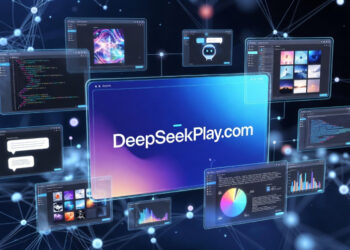Software developers can store, track, and collaborate on projects using the web-based platform GitHub. It makes use of Git, an open-source version management system that permits numerous users to edit web pages at once. GitHub is a platform for building and editing website content, exchanging code files, and working together on open-source projects. It is employed for software project collaboration, tracking, and archiving. It facilitates the sharing of code files and facilitates developer collaboration on open-source projects. Developers can simultaneously write code, monitor changes, and come up with creative fixes for issues that may come up while developing a website with GitHub. As Carpenter shows in her article, non-developers may also use it to create, modify, and update website content.
Best GitHub Alternatives
For most developers, GitHub is a crucial tool since it allows them to take advantage of central project access through code hosting. No matter where they are in the world, users can independently save their modifications to a project and contribute to it. Unlike previous open-source software management services, the project focuses on the potential use of individual repositories (git-managed directories) rather than the collection of source codes. Git and Subversion are two options available to GitHub users for managing, maintaining, and deploying software projects as a VCS (Version Control System).
1: AWS CodeCommit
The AWS CodeCommit platform hosts safe, private Git repositories. Since they connect quickly, this option is handy if you use other AWS products. Your code will be housed in the secure AWS environment, but you may still utilize CodeCommit with your existing Git tools. Your software stack is fully customizable, with a plethora of plugins from AWS partners. The AWS ecosystem is safe and scalable because there is no hardware to buy. The purpose of AWS CodeCommit is to facilitate group software development. Your code is simple to commit, branch, and merge, which makes it simple for you to stay in charge of the tasks completed by your team. CodeCommit now supports pull requests, which provide a mechanism to request code reviews and hold code discussions with collaborators.
Using Git, you can begin working with a repository that you establish using the AWS Management Console, AWS CLI, or AWS SDKs. You can establish up to 5,000 repositories using AWS CodeCommit by default and up to 25,000 more repositories upon request. Any type of file, including application assets like graphics and libraries, can be stored and versioned alongside your code. Repositories are simple to build when needed and to remove once finished. To manage your repositories, you can utilize the AWS Management Console, AWS CLI, and AWS SDKs. Git graphical tools and commands are other ways that you can work with the source files in your repository. AWS CodeCommit integrates with your current Git tools and supports all Git commands. Plugins for your development environment or continuous integration/continuous delivery systems can be integrated.
2: GitLab
With its DVCS, GitLab provides numerous helpful tools, including a project webpage and an integrated wiki. GitLab’s continuous integration features automate code delivery and testing, which reduces test phase time. With GitLab, you can quickly access every crucial component of your project with pull requests, a code viewer, and proper dispute resolution. Ruby was primarily used to write the application. GitLab’s DVCS is packed with features, such as a dedicated project website and an integrated project wiki. GitLab’s continuous integration (CI) features allow you to automate code delivery and testing, allowing you to work more productively and spend less time waiting for tests to pass. Get access to pull requests, problems, a code viewer, and merge conflict resolution for any aspect of your project.
3: SourceForge
In the past, SourceForge was the top option for open-source solutions and existed before GitHub and other competitors. The business experienced a few malware-related issues in 2015; however, since January 2016, it has resumed operations. Multi-factor authentication is now available on SourceForge, demonstrating the software’s vigilant approach to security. Buyers may locate, evaluate, and compare business software and IT services on SourceForge, a comprehensive platform for comparing business software and services. Software sales? You’re in the proper location.
Every day, we’ll assist you in connecting with millions of intent-driven software and IT buyers and influencers. An open-source community resource called SourceForge is committed to maximizing the success of open-source initiatives. To help us establish an excellent resource for the creation and dissemination of open-source software, we thrive on community collaboration. A built-in code directory and bug tracking are further capabilities. SourceForge was available before GitHub and numerous other open-source version control solutions. After experiencing some virus issues in 2015, the company was acquired and was operating profitably as of January 2016. When it came to free and open-source software code repositories, SourceForge was the preferred option. In keeping with their shift to more stringent security, the organization now provides multi-factor authorization. Features include a built-in code directory, conversations, and problem tracking.
4: Apache Allura
Apache Allura, with this free solution, you can submit your changes to a Mongo database, monitor issues, and add markup to your code comments. Git, Hg, and Subversion (SVN) are languages that Apache supports. Color-coded diffs let you keep track of your changes and commit links to other tickets and issues to help you stay organized. Create internal wiki pages for the needs of app users and documentation. Tools are connected, and artefacts may be searched. Apache’s Allura is an open-source program used to manage bug reports, wiki pages, blogs, conversations, and source code repositories, among other online material.
Allura’s issue tracking feature set includes the ability to use file attachments, markdown formatting, and issue tickets with “milestones. The enhanced search syntax allows you to store commonly used search queries as well. However, this approach does not support code verification. Python was used to construct the platform. Apuana Allura is an open-source version of a software forge, which is a website that may be used to handle wiki pages, blogs, bug reports, source code repositories, debates, and more for any number of different projects.
5: Cloud Source (Google)
Google’s Git version control was transferred to the Google Cloud Source platform following the closure of Google Code. You can use Google’s repositories in addition to GitHub, Bitbucket, and other repositories that Cloud Source connects to. These provide storage throughout the Google infrastructure, protecting your apps and code. Look through all of your linked code on your browser, and use cloud diagnostics to look into problems while your code is running in the background. You can see side-by-side debugging with any application using the Stackdriver Debugger. Following its demise, Google Code was combined into the version control system of the Google Cloud platform.
As needed, additional repositories can be joined via GitHub or Bitbucket using Cloud Source Repositories, which are currently under beta testing. In order to ensure the security of your code and apps, you can also use Google’s repositories, which house your files as part of the entire Google infrastructure. The primary advantage of utilizing a cloud source repository is that you can use cloud diagnostics to track issues and conduct a direct browser search for code while your code is running in the background.
6: GitKraken
GitKraken prioritizes time-saving measures that let users test code more effectively. The system is renowned for its large UI, emphasis on speed, and straightforward Git functionality. Any mistakes can be corrected right away using a functional undo button, which reduces the workload. Non-profit organizations and businesses with fewer than 20 employees can use the free version. Additional helpful features, such as profile support that allows different projects to be kept apart, are available in the pro edition. GitKraken is renowned for its elegant user interface, emphasis on speed, and Git user-friendliness. The platform is meant to save you time when developing and testing. They come with an undo button, which is really helpful for going back and fixing errors. Companies with fewer than 20 employees can use the free version, as can non-profit and educational establishments. However, the Pro edition comes with a number of unique features, such as the ability to partition your projects into multiple profiles. GitKraken is compatible with Linux, Mac, and Windows computers.
7: Beanstalk
You can develop, commit, review, and deploy straight from your browser with this browser-based and cloud-based code management software, Beanstalk, which allows you to work from any location on the globe. To keep the team informed about all code decisions and modifications, Beanstalk connects with email and online messaging platforms. Git and SVN are also supported. Code reviews involve discussions and issues. There is built-in analytics with commit statistics.
With two-factor authentication, robust password enforcement, and complete bank-level encryption, Beanstalk places a high emphasis on security. Use the free trial or Beanstalk’s monthly subscription plan to give it a try. Wildbit, a 1999-founded software business with headquarters in Philadelphia, runs Beanstalk. Beanstalk was created to free teams from the burden of hosting code and overseeing deployments, so they could concentrate on creating incredible stuff. We are privately held, profitable, and debt-free. All data is encrypted at the bank level when it is moved to and from our fully managed environment. Our data centre is a Type 2 SSAE 16 SOC 1 accredited facility with 24-hour monitoring, biometric scanning, and keycard access.
8: Gitea
Gitea is an easy-to-use, self-hosted software development solution that combines package registry, code review, team collaboration, Git hosting, and continuous integration and development. It is comparable to Bitbucket, GitLab, and GitHub. Gitea’s initial code was nearly entirely modified when it was forked from Gogs. Gitea facilitates the creation and management of git-based repositories. Additionally, it simplifies code reviews, improving code quality for users and companies alike. Gitea Actions, an integrated continuous integration and delivery system from Itea, is compatible with GitHub Actions. Users can use the well-known YAML format to develop processes or make use of the more than 20,000 pre-existing plugins. Bugs, features, and requirements can be effectively managed via Kanban boards, issue tasks, and labelling.
With the addition of branches, tags, milestones, assignments, time tracking, and dependencies, these technologies facilitate the planning and monitoring of your development process. An outstanding and user-friendly version control system is Gitea. It offers a simple, user-friendly interface that facilitates team collaboration and code project management. In addition, Gitea offers a plethora of tools that can enhance team productivity and code quality, such as issue tracking, code review, and continuous integration. Gitea is a beneficial tool that can help corporate teams as well as lone developers. Simple-to-use, open-source, platform-neutral, distributed source code management enables several developers to clone, edit, and commit code from separate computers. You can even have your own self-hosted git repository.
9: Launchpad (Canonical)
Ubuntu and other open-source projects are the primary uses of Launchpad, a collaborative development platform. Launchpad, developed by Canonical Ltd., provides tools such as code reviews, issue tracking, and translations to facilitate software development. Due to the existence of a product bearing the same name by German software giant SAP, we clearly state that this is a Canonical project. Since it was necessary to get Ubuntu’s riscv64 port underway, Launchpad has long supported building for riscv64. Because server-class hardware with the hypervisor extension is still in its infancy, we need RAV64 hardware in our data centre.
As the hub for ongoing development of the Ubuntu operating system and other projects, Launchpad is a prime illustration of Canonical’s commitment to open source. It would help if you considered participating. Launchpad facilitates collaborative development across several projects by offering a platform for code hosting and evaluation. A notable characteristic of Launchpad is its robust translation system, which enables contributors from all around the world to translate open-source projects into numerous languages. An essential component of the development of one of the most widely used Linux distributions, Ubuntu, is Launchpad. It facilitates bug tracking, software package management, and community collaboration with Ubuntu’s large user base.
10: Gogs
Another option for GitHub is called Gogs, which offers a quicker and more straightforward method for configuring self-hosted Git services. This version control tool allows you to distribute binary files independently across different platforms. Gogs is portable and compatible with Windows, Mac OS X, Linux, etc. Gogs can be run on a cheap Raspberry Pi, thanks to its minimum needs. Gogs is a self-hosted Git service with three main goals: extensibility, stability, and simplicity.
It is compatible with Linux, macOS, Windows, and ARM-based systems, and it is written in the Go programming language. It is intended to be simple to install and set up. Installing Gogs is as easy as running the platform’s binaries. It can also be packed or distributed using Vagrant or Docker. Any platform that the programming language Go can compile for, such as Windows, Mac, Linux, ARM, etc., may execute Gogs. Gogs run on a cheap Raspberry Pi and have very few system requirements. Gogs are one of the few GitHub substitutes that can help you convince your partner that you need a NAS device for purposes other than watching the newest episodes of your favourite anime series. Some users even run Gogs instances on their NAS equipment. Gogs is a self-hosted Git service with a number of capabilities to help software development teams. It is simple to install and set up.
11: OneDev
OneDev is a self-hosted Git server that comes with Kanban and CI/CD integrated into it. Symbol navigation and code search, customizable issue fields and workflows, a visual editor for CI/CD pipelines, a service desk for customer assistance, and code annotation with static analysis results are just a few of the capabilities it provides to support the entire software development lifecycle. Regular expressions can be used to search the code and switch to any commit. Under the hood, OneDev uses Lucene to index the code incrementally.
During the search phase, the regular expression’s literal trigrams are extracted for a coarse search, and the outcome is an exact match. Because of this, regex search is rapid—even for big repositories like Linux. In my whole career as a software engineer, OneDev is by far the best tool I’ve used. It makes it simple for my team to manage tasks and code, build complex, reusable pipelines for our continuous integration and delivery (CI/CD), implement role-based branch protection (optional), and provide in-depth code reviews for pull requests. And these are only a few examples.
Many thanks for making something so unique. You don’t need to do any additional preparation to perform symbol search and navigation in each commit; push your code. In diffs, you may also quickly access symbol definitions while examining commits or pull requests. Many third-party apps on GitHub can accomplish this, but they show the results on their apps, which makes review tasks like leaving comments on analysis results challenging. Not to mention that these services come with a cost. For many workflows, the straightforward open/close state of GitHub/GitLab problems is inconvenient. You can address this problem in four states using customizable issue states: open, committed, test-ready, and released. With performance in mind, OneDev can be utilized for medium-sized applications on a 2-core, 2 GB machine.
12: Rhodecode
Rhodecode is an open-source, secure application for managing business source code. Additionally, it is a unified tool for Subversion, Git, and Mercurial. The Community Edition of RhodeCode is free. An open-source platform for managing repositories is called RhodeCode. It offers team communication across Git, Subversion, and Mercurial, as well as unified security. Code review and automation are unified for developers thanks to a shared set of tool connections that work with all repositories. Businesses receive much-needed centralized access controls and user authorization management for all software assets.
On the other hand, you can integrate with enterprise tools, get premium support, and more if you purchase the enterprise edition. Produce excellent outcomes more quickly. Create software in a team atmosphere that encourages creativity, advances projects, and makes it easier to manage and distribute developer resources. Global development teams working at scale need SCM solutions that are both highly performant and safe. Our goal at RhodeCode is to go above and beyond what these challenging multinational enterprises ask of us. Use best practices throughout the company’s code base, code more quickly, test more thoroughly, and minimize errors with RhodeCode. Give our clients in fintech, the military, and other highly secure use cases access to the same secure platform. Improve the way you utilize your staff and financial resources to meet your goals.
Release the value that’s been squandered away from your fresh, agile initiatives by legacy apps and teams. You may derive continuous value from your SVN apps and tools for years to come while taking a no-compromise approach to Git.
13: Trac
A simple project management application is called Trac. It provides a straightforward method for managing web-based software projects. You may oversee the established and development processes of your team with Trac. A better wiki and issue-tracking tool for software development projects is called Trac. Trac is a web-based software project management tool that takes a straightforward approach. Our goal is to remain out of the way while assisting developers in creating excellent applications. Trac needs to interfere less than feasible with a team’s existing policies and development process. Trac supports wiki markup in commit messages and issue descriptions, which makes it easy to create links and references between files, wiki pages, tasks, issues, and changesets. A timeline makes it simple to get an overview of the project and monitor progress by listing all previous and present project activities in chronological order. The roadmap outlines the forthcoming milestones and the path ahead.


















